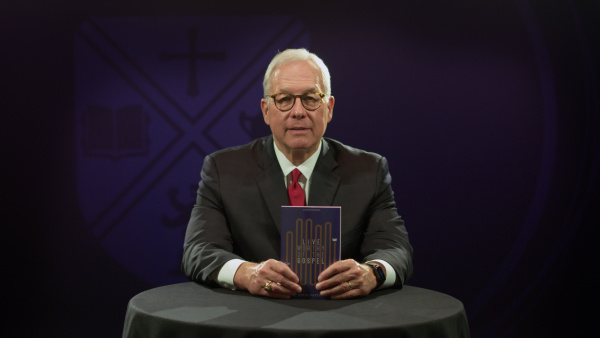PHILIPPIANS 2:9–11
Wherefore God also hath highly exalted him, and given him a name which is above every name: that at the name of Jesus every knee should bow, of things in heaven, and things in earth, and things under the earth; and that every tongue should confess that Jesus Christ is Lord, to the glory of God the Father.
One of the most beautiful threads in Scripture’s tapestry is how God exalts seemingly insignificant people for His name’s sake. Think of Joseph, who was thrown in a pit and sold as a slave and lied and forgotten about before he became the most powerful man in Egypt after Pharaoh. Consider Moses, who went from outlawed baby to a member of Egyptian royalty to outlawed shepherd in the desert to the self-doubting leader of Israel’s exodus. Or Ruth, the Moabitess who loyally loved Naomi, preserved the family line, and became an ancestor of the Messiah. Her descendant David fits this pattern too. He was the seventh-born shepherd boy who became Israel’s greatest king. Another example is Esther, the attractive Jewish girl in a foreign land who was promoted to queen “for such a time as this” (Esther 4:14).
But the most amazing and important instance of this theme is what Paul describes in Philippians 2. Verses 6–8 reveal the mind of the Son when He emptied and humbled Himself; in verses 9–11, we discover the mind of the Father when He exalted and honored His Son. The Son knew from eternity that He would be the Lamb of God, slain for man’s sins. He also knew that He would be exalted to the right hand of the throne of His Father. By the perfect example of Jesus Christ, God the Father forever confirmed the truth that He raises up the humble.
Christ’s Exalted Status
PHILIPPIANS 2:9
Wherefore God also hath highly exalted him, and given him a name which is above every name.
WORD STUDY
Wherefore — introduces the result of the preceding verses
Highly exalted — raised to a high point of honor
Given — graciously granted
Christ did not elude or escape death. He met it head-on and conquered it. He charged into the fangs of death and endured the most powerful arsenal the enemy had at his disposal. And His exaltation to the right hand of His Father in glory is clear proof that through His death and resurrection, Christ won the day. As it says in Hebrews 1:3, “When he had by himself purged our sins, sat down on the right hand of the Majesty on high.” His victory is complete. It is the greatest triumph of all time.
But in this passage in Philippians 2, Paul emphasizes not only what Jesus did but how He did it. The Son of God died for our sins on a despicable Roman cross as the suffering Servant. He won, not by pumping Himself up but by pouring Himself out. And that is why God the Father honors the Son in such glorious fashion. The word wherefore connects verses 6–8 and 9–11. Christ selflessly chose to lower Himself. As a result, His Father gladly chose to exalt Him.
The Father responded to the Son’s redemptive work with two related actions. First, He gave Christ an unparalleled position. He “highly exalted him” (2:9). Because Jesus went to the lowest depths, He was super exalted to the highest position of honor and authority in heaven and in earth. Paul is not teaching that Christ became God again or now possesses more deity than ever before. Remember where Paul’s illustration began, with the Son of God in heaven determining to display His equality with God through giving, not grasping (2:6). He laid aside privilege, not deity (2:7). Though this position has always been rightfully His, it was not apparent during the time He humbly ministered in Galilee and died outside Jerusalem. By divine design it was not announced until after He became the God-man, suffered as the propitiation for our sin, and rose from the dead. The Father has ensured that there is no mistake now. He has declared Christ to be in the highest position possible — He is the Lord.
Second, when Jesus ascended into heaven, the Father gave Him a title that exceeds all other earthly titles of kings, presidents, prime ministers and emperors. God honored Christ with the name of Lord! No mere human has legitimately aspired to this designation, though some have tried. For example, Alexander the Great accepted the attribution as son of Zeus during a visit to a North African temple. The crazy Roman emperor Caligula also fancied himself as a god. But no person in the history of humanity has been able to elude the sure-fire sign of frail humanity — death. Sin’s wages have doomed us all. But Jesus lived a righteous life. He alone conquered death through resurrection. He is in a category by Himself.
What exactly is the name the Father has given the Son? It may initially appear to be His human name, Jesus (Phil. 2:10), but the passage drives toward a different climax. The name of Jesus at which every knee bows is stated emphatically in verse 11: “Jesus Christ is Lord.” The Greek word for Lord (kurios) can simply mean master, and Christ is certainly Master of all. But Paul means even more. Drawing from language in Isaiah 45, he indicates that by exalting Christ, God emphatically declared His Son to be Lord, the covenant God of Israel. Everyone will reverently submit to worship this man because He is the Creator God. No one else shares the name Lord with the God of heaven.
Creation’s Certain Response
PHILIPPIANS 2:10–11
… that at the name of Jesus every knee should bow, of things in heaven, and things in earth, and things under the earth; and that every tongue should confess that Jesus Christ is Lord, to the glory of God the Father.
WORD STUDY
Bow — to bend; to bow; a common idiom for giving homage
In heaven — heaven; heavenly places; referring to angels and demons
On earth — earthly; terrestrial; referring to humans
Under the earth — subterranean; referring to the dead who will be raised
Confess — to confess; to admit
Glory — opinion
The final result of this exaltation will be the inevitable humility of all creation. Paul leaves us with no uncertainty. One day, every knee will bow in worship, adoration, reverence and homage, recognizing Christ for His supreme power and authority. Every tongue will verbally and publicly confess that Jesus Christ is Lord. That includes every living being in heaven, on earth, and under the earth — angels, the redeemed, men of the earth, demons and damned souls. Imagine the majesty, pageantry, electricity and dignity of that moment! What an atmosphere it will be! What a day! Whether saved or lost, all will be compelled to confess who Jesus Christ truly is. We can choose to worship Him as Lord and Savior either now or later. Whoever chooses the latter needs to realize that worshiping Christ is not a matter of if but when and with what consequences.
And all of this is “to the glory of God the Father” (Phil. 2:11). His glad choice to super exalt Jesus to the unparalleled status of Lord may seem to detract from the Father’s own glory. But the opposite is actually true. The exaltation of Christ brings glory to the Father. Jesus actually prayed for this in what is known as the High Priestly Prayer: “Father, the hour is come; glorify thy Son, that thy Son also may glorify thee” (John 17:1). And when all the universe has once again paid homage to the Son, He will also “be subject unto him that put all things under him” (1 Cor. 15:28). The Son’s reign ultimately magnifies the Father.
The Church’s Perfect Pattern
In Philippians 2:6–11 Paul has unfolded the selfless descent and glorious ascent of the incarnate God. Jesus Christ is unique, and this passage clearly accentuates His greatness. At the same time, we must also keep in mind Paul’s overarching message. We should believe that what Paul has explained about Christ is true. But we should also conform our thinking to the pattern Christ has displayed. The Holy Spirit provides this illustration to encourage all believers of the value of humility and of the blessings of a humble mindset in the church.
The truth that God exalts the humble surfaces throughout Scripture. Consider the following passages.
- The fear of the Lord is the instruction of wisdom; and before honour is humility. (Prov. 15:33)
- For every one that exalteth himself shall be abased; and he that humbleth himself shall be exalted. (Luke 18:14)
- Humble yourselves in the sight of the Lord, and he shall lift you up. (James 4:10)
- Yea, all of you be subject one to another, and be clothed with humility: for God resisteth the proud, and giveth grace to the humble. Humble yourselves therefore under the mighty hand of God, that he may exalt you in due time. (1 Peter 5:5–6)
God delights to bless the humble. We can have confidence that humility is always the right choice because He always honors it. Glory came at the end of Christ’s road of humble suffering (1 Pet. 1:10–11). Unity for the sake of the Gospel, as well as glory in the life to come, come at the end of our road of humble service. Jesus became what we are so that we might become conformed to what He is. The result of both is exaltation.
This post is from Live Worthy of the Gospel: A Study in Philippians by Steve Pettit. Copyright 2016 by BJU Press. Printed by permission of BJU Press.
This post is part of the study designed to correspond with the 2020 Fall Chapel Series. Watch the chapel message below:
Join us for chapel via live webcast at 11 a.m. every Monday and Wednesday.








